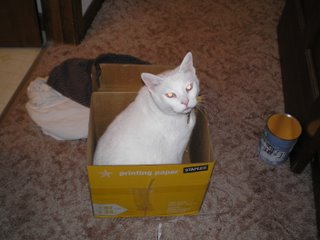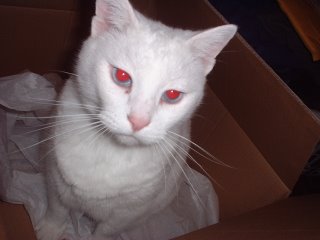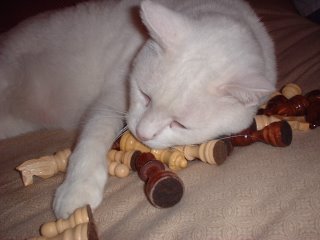I knew that an essay of mine, written back when I was still in graduate school, was appearing in a little local Sonoma County paper called
Women's Voices, but I was pleased to discover that my essay is, in fact, one of the featured pieces in their online edition right now:
http://www.sonomacountywomensvoices.com/showcase.shtmlHere's the essay if you can't follow the link for any reason:
Authoring A Life
By Jordan E. Rosenfeld
More than forty years after her death, I finally discovered Sylvia Plath. A copy of The Journals of Sylvia Plath sat on my husband's bookshelf throughout our courtship and marriage. It's possible that I was even the one who unpacked and shelved it in one of our many moves. When I worked as a clerk at a bookstore in college, I stocked and sold her novel,
The Bell Jar, to eager college students plenty of times, but I never picked it up myself. So why, on the precipice of turning thirty, did I suddenly find myself reaching for that small yellow paperback that had been in plain view for years?
And what are the chances that, at KRCB radio, home of my literary radio show,
Word by Word, two books about Sylvia Plath and her husband Ted Hughes would arrive in my box within days of my beginning to read her journals? One was a biography of the famous couple's poetic marriage called
Her Husband by Diane Middlebrook and the other a novel based upon author Kate Moses' fancy, called
Wintering, of what Sylvia's last months of life might have been like.
The outside observer, particularly one who doesn't believe in a world of symbols, or synchronicity, might say that my encounter was nothing more than a suggestion made by popular culture to my unconscious, since the movie
Sylvia, loosely based on her life, was in theaters at the time.
Still, even if the sudden emergence of Plath's ghost in my life was nothing more than a marketing coup, how can any of that explain the process that unfolded?
I became completely inhabited by Sylvia for two months. I breezed through her journals as if I was reading a fast-paced adventure story or beguiling whodunit. As tempted as one might be to call my experience voyeurism, I believe it quite surpassed that. Because she only lived thirty-one years, the journals are both a kind of microscope of her inner life, which was rich and tumultuous and genius, and a kind of mythic creation story in its own right. In those journals she created a private landscape that neither Ted, her mother nor her children ever saw until after her death.
Sylvia was drawn toward symbols and mythology. Early on she was affected by the Greek myth of Ariadne, eventually abandoned by her lover Theseus. The myth Sylvia loved and integrated into her poetry prophetically played out in her own life when her fierce marriage to Ted Hughes ended in his adulterous abandonment. It is almost as if the script that Sylvia laid down in her journals, of her own longing and desire, was the template she began to live her life by. Even before that, as she describes the kind of man she wants to marry in her late teens, from physique to temperament, it is hardly a surprise when a man matching those traits, Hughes, turns up, as if her words on the page were an incantation drawing him to life.
You might think that because I was the same age as Plath was when she died, I simply identified with Plath on some surface level. Both writers. Both moody and temperamental. Both uncertain about how to balance creative life and real life. You might think I projected myself into her story which, with her ambitions and craving for publication, her sharp self-criticism and driving Type-A personality, are mirror images of me. But you'd be only half right.
Once I became trapped inside the weave of Sylvia's life, I was overtaken by a familiarity that seemed to rise from a memory tucked not in my brain so much as in a kind of cellular memory. I recall being eight years old, spinning narratives composed of my own fragmented early life. My real parents, struggling with addiction and even darker battles, became a disappeared fairy queen, a bewitched woodcutter. My story girls were heroines who faced off with monsters and thieves and the cruel and cutting archetypes of all great myths—loss itself. In order to accommodate the rough shod world of reality that didn't match up with the needs of a child, I wrote parallel stories in a form I could understand and explain. Is it a surprise, then, that the story I began to write down became the story I lived? Just like Sylvia appeared to have written her career, her husband, and her children into being.
We are the authors of our lives, but there is something powerful, bigger than us that emerges when we catalogue and note-take the details of our lives. Words are powerful, alchemical, like shamanic rituals bringing things into being, singing life out of nothingness—creation myths.
When I reached the end of Sylvia's journals, the biography and then Kate Moses' stunning novel about her, I had to keep myself from falling into depression. It was painful enough that she died and took her words with her. It was also painful that forty years later, I was losing her all over again when I set the book down.
Slowly it became clear that something of Sylvia remained with me, the way some essence of the myth Ariadne remained with her. She built a psychic landscape populated by resonant archetypes. She chose these archetypes from early on, based on the variables given to her at birth and then, slowly, she followed them through to their end. She became Ariadne, abandoned by Theseus, only to be resurrected and loved by me and other writers down the decades.
Sylvia's work was a startling mirror for me reflecting that I, too, have been living out certain stories and myths. Not only do they manifest in my fiction, they manifest in the choices I make in my life. I have the Cinderella complex perhaps‹a young girl striving against the cruelty of a stepmother (world/ job/ ideology) who doesn't love her; the loss of the all-powerful, all-loving father or parent (birth /separation from source/loss of innocence) keening for a romantic prince (future/career/mate) that promises love and success.
Her easy blurring of real life and writing life reminded me with great clarity that we author our
own lives, whether we write or not.
* * *
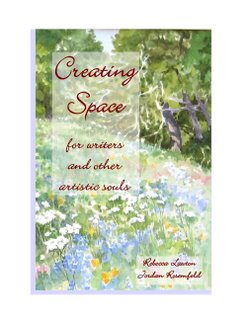



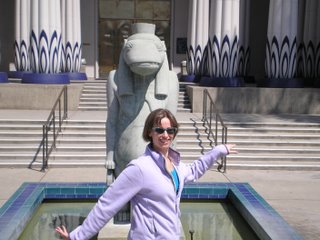 Yes, I am in fact walking like an Egyptian here
Yes, I am in fact walking like an Egyptian here E. feels like a Pharaoah
E. feels like a Pharaoah Jordan smiling in front of tampon dispensor
Jordan smiling in front of tampon dispensor What I might look like in a few thousand years
What I might look like in a few thousand years Faux Egyptian paintings
Faux Egyptian paintings The Real McCoy--or, uh, Tutenkhamen
The Real McCoy--or, uh, Tutenkhamen